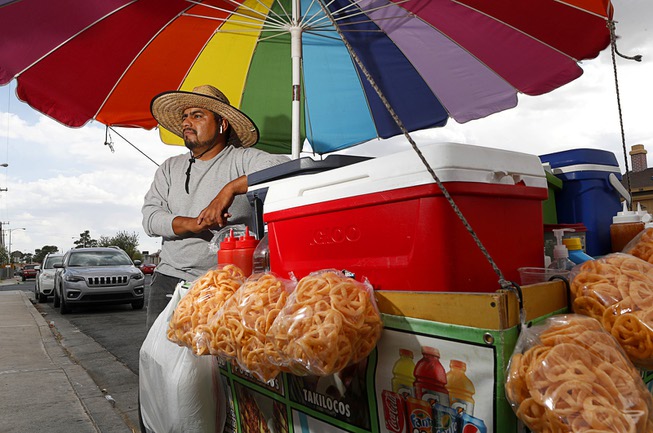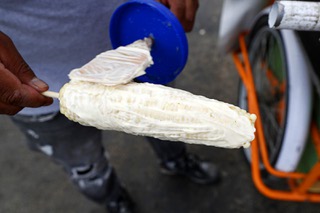
Street vendor Luis Sanchez waits for customers by his mobile food stand in a residential neighborhood in North Las Vegas Wednesday, June 14, 2023. Senate Bill 92, signed by Governor Joe Lombardo, when fully implemented, will legitimize street vendors across the state, providing them with the necessary permits to operate and grow their small businesses. A town hall session held by Make the Road Nevada and the Nevada Immigrant Coalition laid out what the expectations should be for vendors and law enforcement until the relevant laws take effect by July 1, 2024.
Saturday, June 17, 2023 | 2 a.m.
High temperatures, wind and a rare smattering of rain Wednesday afternoon wouldn’t deter street vendor Luis Sanchéz as he happily bustled around his cart at his regular spot in North Las Vegas.
He serves Mexican classics such as elote — corn topped with butter, mayonnaise and cheese — various flavors of raspados, or shaved ice, and more at Antojitos Mexicanos, his food cart.
Sanchéz, originally from Mexico, took up the mantle of his cart from his father. After five years of living in Las Vegas and working as a street vendor with a slew of loyal customers, new legislation will allow him and his peers to apply for health permits and other licenses to legitimize and legalize their businesses in Nevada’s economy.
“This is great for him,” said Andrea Masnata, a spokesperson for Make the Road Nevada who translated for Sanchéz, a native Spanish speaker. “Right now, he says that this is going to benefit not only him, but actually the community, his family and other street vendors that are involved in this. He’s very excited about this new change.”
Senate Bill 92, sponsored by State Sen. Fabian Donate, D-Las Vegas, establishes “requirements for the regulation of sidewalk vendors” at the county and city levels, as well as the adoption of local health regulations and the creation of the “Task Force on Safe Sidewalk Vending.” Gov. Joe Lombardo signed the measure into law this month.
Jose Rivera, environmental justice organizer for Make the Road Nevada, said the Las Vegas-based nonprofit has been campaigning for the legalization of street vending in Nevada for about two years, after initially connecting with street vendors on environmental concerns, such as extreme temperatures.
“Through the process, we learned that street vending in Nevada was illegal at the time, and they were being criminalized,” Rivera said. “And so, apart from being affected environmentally, they were being criminalized by local governments.”
He pointed to an area in Las Vegas previously had been a common gathering spot for street vendors because of the ample shade provided by nearby trees, until the city took notice and began questioning the vendors, and taking down trees so it would be less viable for them.
“When we had these conversations we started learning that vendors — all they wanted was an equal access, or an equal opportunity, to apply for licenses to legitimize their business,” Rivera said.
The legislative process involved a lot of advocacy and working with Donate, other lawmakers and the street vendor population — many of whom Rivera said testified in Carson City themselves to ensure their voices were heard.
To see the street vending effort gain traction and ultimately be legalized has been a “beautiful experience,” Rivera said, and he hopes that the movement will grow outside of Nevada to other states where street vending remains illegal.
“We’re very excited,” he said. “And we’re holding conversations with vendors right now to let them know — update them on what’s going on in the legislative process.”
As government, health and safety leaders begin to implement the legislation over the coming weeks, Rivera said next steps on the advocacy front include informing the street vending community about which licenses will become available to them and why they’re beneficial, how they can qualify, how they can apply and more.
Sanchéz said he is very grateful to have the ability to apply for and receive official permits for his business, and hopes the process proves to be smooth and accessible for himself and other street vendors.
He is glad to finally have the support of the law as a street vendor, Sanchéz said, especially when it comes to people stealing from his cart — a common threat faced by street vendors, who operate outdoors and are relatively exposed.
“(For a) long time, we have been victims of racism, threats ... but we had to bear with it, because we didn’t have any backup within the law,” Masnata said, translating for Sanchéz. “But now that’s changing. So that’s a huge step for him.”
All parties can benefit from the legalization of street vending, Rivera emphasized, not just street vendors. Consumers can now be confident that the food or drink they buy from a street vendor passes health regulations, he said, and the street vending overall will promote entrepreneurship in Nevada.
“It’s going to help our economy in the state of Nevada,” he said. “It attracts tourism. It’s also going to help our families and communities feel safe — to be able to prosper in Nevada. We want to ensure that communities feel safe. So, with this bill, we’re hoping that that’s a good step towards it.”
Sanchéz runs his cart year-round — seven hours a day — as his livelihood, to provide for his family.
“So, this is very important for him,” Masnata said, translating for Sanchéz. “And this is something that is very impactful.”
[email protected] / 702-990-8926 / @_katieann13_

